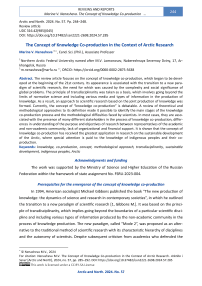The Concept of Knowledge Co-production in the Context of Arctic Research
Автор: Nenasheva M.V.
Журнал: Arctic and North @arctic-and-north
Рубрика: Reviews and reports
Статья в выпуске: 57, 2024 года.
Бесплатный доступ
The review article focuses on the concept of knowledge co-production, which began to be developed at the beginning of the 21st century. Its appearance is associated with the transition to a new paradigm of scientific research, the need for which was caused by the complexity and social significance of global problems. The principle of transdisciplinarity was taken as a basis, which involves going beyond the limits of normative science and including various media and types of information in the production of knowledge. As a result, an approach to scientific research based on the joint production of knowledge was formed. Currently, the concept of “knowledge co-production” is debatable. A review of theoretical and methodological approaches to its definition made it possible to identify the main stages of the knowledge co-production process and the methodological difficulties faced by scientists. In most cases, they are associated with the presence of many different stakeholders in the process of knowledge co-production, differences in understanding of the purpose and objectives of research between representatives of the academic and non-academic community, lack of organizational and financial support. It is shown that the concept of knowledge co-production has received the greatest application in research on the sustainable development of the Arctic, where special attention is paid to the knowledge of indigenous peoples and their co-production.
Knowledge, co-production, concept, methodological approach, transdisciplinarity, sustainable development, indigenous peoples, Arctic
Короткий адрес: https://sciup.org/148330031
IDR: 148330031 | УДК: 316.42(985)(045) | DOI: 10.37482/issn2221-2698.2024.57.285
Список литературы The Concept of Knowledge Co-production in the Context of Arctic Research
- Gibbons M., Trow M., Scott P., et al. The New Production of Knowledge: The Dynamics of Science and Research in Contemporary Societies. London, Thousand Oaks, New Delhi, SAGE Publications, 1994, 191 p.
- Nowotny H., Scott P., Gibbons M. Re-Thinking Science: Knowledge and the Public in an Age of Un-certainty. Cambridge, Polity, 2001, 278 p.
- Lang D.J., Wiek A., Bergmann M., et al. Transdisciplinary Research in Sustainability Science: Practice, Principles, and Challenges. Sustainability Science, 2012, vol. 7, pp. 25–43. DOI: https://doi.org/10.1007/s11625-011-0149-x
- Brandt P., Ernst A., Gralla F., et al. A Review of Transdisciplinary Research in Sustainability Science. Ecological Economics, 2013, vol. 92, pp. 1–15. DOI: https://doi.org/10.1016/j.ecolecon.2013.04.008
- Polk M. Transdisciplinary Co-Production: Designing and Testing a Transdisciplinary Research Framework for Societal Problem Solving. Futures, 2015, vol. 65, pp. 110–122. DOI: https://doi.org/10.1016/j.futures.2014.11.001
- Miller C.A., Wyborn C. Co-Production in Global Sustainability: Histories and Theories. Environmental Science and Policy, 2018, no. 113, pp. 88–95. DOI: https://doi.org/10.1016/j.envsci. 2018.01.016
- Metz A., Boaz A., Robert G. Co-Creative Approaches to Knowledge Production: What Next for Bridg-ing the Research to Practice Gap? Evidence & Policy, 2019, vol. 15, no. 3, pp. 331–337. DOI: https://doi.org/10.1332/174426419X15623193264226
- Brandt P., Ernst A., Gralla F., et al. A Review of Transdisciplinary Research in Sustainability Science. Ecological Economics, 2013, no. 92, pp. 1–15. DOI: https://doi.org/10.1016/j.ecolecon.2013.04.008
- Mobjörk M. Consulting Versus Participatory Transdisciplinarity: A Refined Classification of Transdis-ciplinary Research. Futures, 2010, vol. 42, no. 8, pp. 866–873. DOI: https://doi.org/10.1016/j.futures.2010.03.003
- Lemos M.C., Morehouse B.J. The Co-Production of Science and Policy in Integrated Climate Assess-ments. Global Environmental Change, 2005, vol. 15, no. 1, pp. 57–68. DOI: https://doi.org/10.1016/j.gloenvcha.2004.09.004
- Hegger D., Dieperink C. Toward Successful Joint Knowledge Production for Climate Change Adapta-tion: Lessons from Six Regional Projects in the Netherlands. Ecology and Society, 2014, vol. 19, no. 2, art. 34. DOI: https://doi.org/10.5751/ES-06453-190234
- Norström A.V., Cvitanovic C., Löf M.F. et al. Principles for Knowledge Co-Production in Sustainability Research. Nature Sustainability, 2020, no. 3, pp. 182–190. DOI: https://doi.org/10.1038/s41893-019-0448-2
- Cvitanovic C., Hobday A.J., van Kerkhoff L., et al. Improving Knowledge Exchange among Scientists and Decision-Makers to Facilitate the Adaptive Governance of Marine Resources: A Review of Knowledge and Research Needs. Ocean and Coastal Management, 2015, vol. 112, pp. 25–35. DOI: https://doi.org/10.1016/J.OCECOAMAN.2015.05.002
- Reed M.S. Stakeholder Participation for Environmental Management: A Literature Review. Biologi-cal Conservation, 2008, vol. 141, no. 10, pp. 2417–2431. DOI: https://doi.org/10.1016/j.biocon.2008.07.014
- Brandt P., Ernst A., Gralla F., et al. A Review of Transdisciplinary Research in Sustainability Science. Ecological Economics, 2013, vol. 92, pp. 1–15. DOI: https://doi.org/10.1016/j.ecolecon.2013.04.008
- Thompson M.A., Owen S., Lindsay J.M., et al. Scientist and Stakeholder Perspectives of Transdisci-plinary Research: Early Attitudes, Expectations, and Tensions. Environmental Science & Policy, 2017, vol. 74, pp. 30–39.
- Degai T., Petrov A.N., Badhe R., et al. Shaping Arctic’s Tomorrow through Indigenous Knowledge Engagement and Knowledge Co-Production. Sustainability, 2022, vol. 14, iss. 3, art. 1331. DOI: https://doi.org/10.3390/su14031331
- Nenasheva M.V. Resilience of Arctic Communities: Concept, Methodology and Research Directions. Arktika i Sever [Arctic and North], 2023, no. 51, pp. 262–273. DOI: https://doi.org/10.37482/issn2221-2698.2023.51.262
- Yua E., Raymond-Yakoubian J., Daniel R., et al. A Framework for Co-Production of Knowledge in the Context of Arctic Research. Ecology & Society, 2022, vol. 27, iss. 1, art. 34. DOI: https://doi.org/10.5751/ES-12960-270134
- Obermeister N. Local Knowledge, Global Ambitions: IPBES and the Advent of Multi-Scale Models and Scenarios. Sustainability Science, 2019, vol. 14, pp. 843–856. DOI: https://doi.org/10.1007/s11625-018-0616-8
- Raymond-Yakoubian J., Daniel R. An Indigenous Approach to Ocean Planning and Policy in the Ber-ing Strait Region of Alaska. Marine Policy, 2018, vol. 97, pp. 101–108. DOI: https://doi.org/10.1016/j.marpol.2018.08.028
- Petrov A.N., BurnSilver S., Chapin F.S., et al. Arctic Sustainability Research: Toward a New Agenda. Polar Geography, 2016, vol. 39, iss. 3, pp. 165–178. DOI: https://doi.org/10.1080/1088937X.2016.1217095


